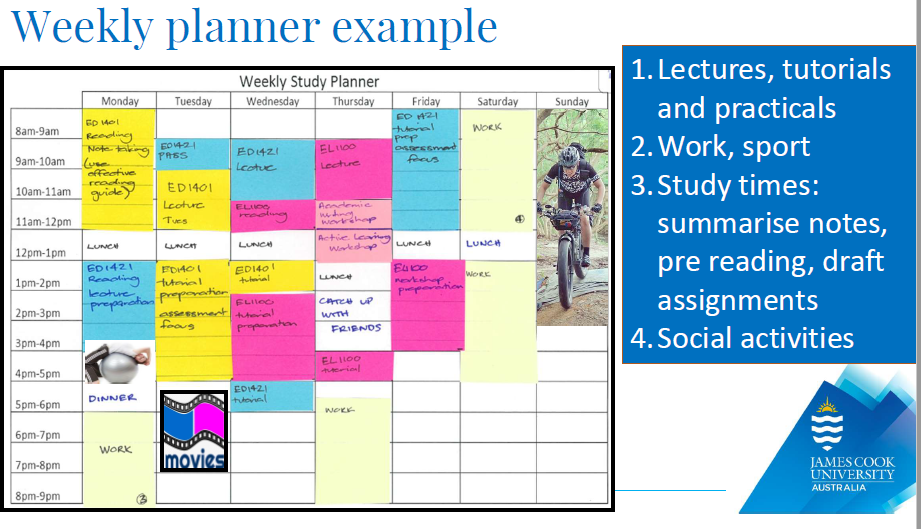Wellbeing and Life Balance
Meghan Boland and Tony Hewitt

Introduction
Wellbeing is a combination of your physical, mental, emotional, spiritual and social health, and is strongly linked to aspects of happiness and life satisfaction. Trying to achieve a balance of these factors is the best way to maintain optimal wellbeing. Each year, a national Student Experience Survey is deployed in Australian universities, which continues to show that maintaining mental and physical health while studying is the number one challenge that students face. While, managing their study/life balance is the second greatest challenge reported each year.
“Challenges are what make life interesting. Overcoming them is what makes life meaningful.”
– Joshua J. Marine
Change and Challenges
The commencement of higher education involves a lot of life changes, which can be exciting, but also challenging. It is normal to have a range of feelings and emotions as you adjust to your new norm and find your feet over a period of time. Here are a list of common challenges that students face that can impact on their wellbeing:
- Balancing university with the rest of your life
- Managing deadlines and responsibilities
- Understanding academic expectations
- Financial changes and difficulties
- Moving away from home
- Building a new social network
- Managing carer responsibilities
- Failing an assessment or subject
- Breakdown of relationship
- Lack of motivation
- Illness or injury
- Exam anxiety
Stress Happens
A certain level of daily stress is beneficial as it can keep you energised, motivated and productive. However, too much can lead to a lack a concentration, impaired memory, inability to make decisions, avoidance behaviours (self-isolation, stop engaging with uni), and health issues. You may also experience physical symptoms, such as an increased heart rate, shortness of breath, muscle tension, nausea, reduce immunity, hot and cold flushes, and trouble sleeping. University involves change, challenges and moving outside your comfort zone, which your mind and body can perceive as threats and over activate your stress levels. These stressors can be cumulative, and too many stressors in a short period of time may trigger a response that begins to cause distress.
Top Tips
- Accept stress as part of life: Stress can’t always be escaped, but it can be managed. Stress will be around when you leave university too, so see this time as an opportunity to learn new ways of dealing with it.
- Know your stress triggers: Everyone has particular things that trigger their stress responses – giving presentations, writing assignments, being in social situations, or being asked to do too many tasks at once. Knowing your triggers helps you prepare for those situations and activate strategies when your stress levels begin to rise.
- Know your stress responses: Are the first signs of your stress response that you begin to chew your fingernails, feel pain in your chest, get a headache or indigestion, lose concentration, eating more or less, or get irritable with yourself or others? Recognising your stress response is important, so you can implement wellbeing strategies to manage it.
Tips for Wellbeing
Taking care of your wellbeing will help you better cope with everyday stressors, and enable you to be more resilient when faced with unexpected challenges. Complete wellness is not realistic and no one is ever completely well or unwell – it’s about achieving a good balance across all aspects of your health.
Be Healthy
- Consume nutritious food and eat regularly to keep your energy levels up – students often reach for junk foods when they are stressed and it is better to option brain foods instead (proteins, nuts, fruit and veg)
- Get quality sleep (eight hours a night) your brain needs time to shut down and process new information each day, so you are actually helping your studies as you snooze
- Exercise regularly or go for a brisk walk every day – it is the best stress reduction technique around
- Drink plenty of water – your brain is 73% H20, so it is vital for your cognitive functioning as well as your general wellbeing
- Moderate alcohol and caffeine intake and avoid drugs
- Take regular study breaks to help your mind and body rest and revive
- Learn relaxation, mindfulness and meditation techniques
- Have regular health check-ups with your GP
Be Kind to Yourself
- Acknowledge you are dealing with challenges and be self-compassionate
- Challenge negative thoughts and try to replace them with positive, encouraging ones – cognitive distortions or thinking errors (catastrophizing) can intensify when you are stressed or anxious
- Remind yourself of what’s going well in your study and life to foster a sense of gratitude
- Focus on your strengths and values
- Have some ‘me time’ each day and do something that makes you feel good and helps you relax
- Know it is normal to feel unhappy some times
- Try and find humour in situations
- Learn to say ‘no’ – study involves a significant time and financial investment, so you will need to practice prioritising
- Seek help if you are experiencing persistent homesickness or loneliness, which are common occurrences in first-year students
Be Connected
- Schedule regular time with friends and family and talk about how you are feeling (good, bad and the ugly)
- Find people with similar interests and values to you and spend time together
- Ask another student to be a ‘study buddy’, or just catch up for a coffee regularly
- Play with your pets (or find a friend with a pet, if you don’t have one) – it is great stress relief
Be in Control
- Don’t worry about the past and the future as you have no control over them – you can only control the here and now (present moment)
- Focus on your ‘sphere of control’ – your response to people and things around you
- Plan your day, week and semester – being organised can help reduce concerns about the future
- Recognise the difference between a current, real problem and a hypothetical one, so you use your energy wisely
- Make changes to bring your life more in line with your values and long-term goals
- Accept that sometimes you need to take action and push yourself, even when you don’t feel great
- Defuse your thinking – your thoughts are just words and pictures in your mind and you don’t have to believe them or base actions on them all the time
- Remember that stressful times are usually finite, so they do come to an end – this truism can often help you cope in the moment
- Try not to make any major life decisions when you are feeling overwhelmed as things often seem worse when you are stressed or anxious.
Life Balance
“Balance is not something you find, it’s something you create.”
– Jana Kingsford
As outlined in the introduction to this module, study/life balance is the second greatest challenge facing Australian university students. This balance is often defined as a satisfactory level of involvement/fit between the multiple roles in a person’s life. Learning to manage your time is an important life skill to develop, particularly when you are studying and have many conflicting priorities and deadlines. However, this schedule must also include time for your social, emotional, physical and intellectual wellbeing, as well as your paid work and study. By placing a priority on your wellbeing, your work and study will be more productive.
Below is an example of a student weekly planner (it includes: lecture/tutorials, work, sport, study time, and social activities):

Time management is important in order to achieve your aspirations and goals with the least amount of stress. JCU recommends that students allocate a minimum of 10-12 hours/week/subject to study commitments. Around 25% of your time will be spent attending classes/webinars and the other 75% will involve independent study. This self-directed study will include academic reading, reviewing/synthesising notes, completing tutorial exercises, group study, as well as assignment and exam preparation. For a full-time student studying three or four subjects, it is a significant time commitment (36-48 hours/week). It is helpful to create weekly and semester planners (see below) to stay on track and share these with your nearest and dearest (parents, partners, children), so there is a shared understanding of your study commitments. For more information about how James Cook University can support you during your studies. Please go to the JCU Student Support Webpage.
References
James Cook University. (2023). GetReady4Uni: Module 3 – Wellbeing and Life Balance. https://www.jcu.edu.au/getready4uni/wellbeing-and-life-balance

